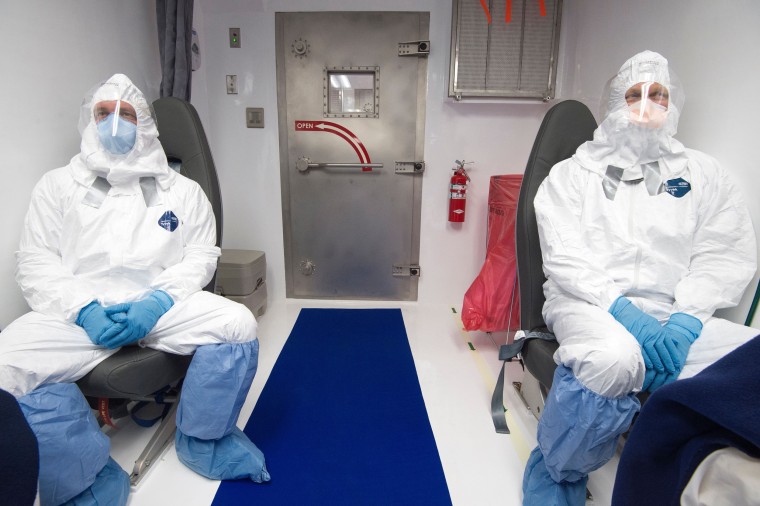As an outbreak of Ebola spreads in Uganda, officials from the Centers for Disease Control and Prevention remain confident that the virus can be contained.
Joel Montgomery, who leads the agency's Viral Special Pathogens branch, recently returned from Uganda, where he met with CDC teams already on the ground and officials from the country's Health Ministry.
As of Tuesday, there had been 60 confirmed cases and 24 deaths in the outbreak, which began last month, according to the Health Ministry.
"I feel confident that Uganda can control this," Montgomery said. "They've been responding to Ebola outbreaks for years now and are actually quite good at it."
The CDC alerted physicians nationwide to the outbreak this month, asking them to be aware of symptoms and to review how they would care for a patient in the event that a sick traveler arrived in the U.S.
Kevin Griffis, the head of communications at the CDC, said Tuesday that there are no suspected or confirmed cases of Ebola in the U.S., notwithstanding misinformation circulating on social media.
The U.S. has routed all travelers from Uganda to one of five airports to be screened for symptoms, such as fever. It is not a foolproof system, however. It can take up to 21 days before a patient with Ebola starts to show symptoms.
Still, agency officials and public health experts say the odds of an Ebola patient’s being in the U.S. are low and trust that the virus could be contained if it arrived on U.S. soil.
"We know how to control it. We know how to stop it," Montgomery said. "And that's over a decade's experience in dealing with these responses."
Experts have expressed confidence in the CDC's handling of the outbreak so far, despite missteps during the Covid pandemic.
Tara Smith, a professor of epidemiology at Kent State University College of Public Health in Ohio, said the response to Ebola in Uganda has been appropriate, and she commended the "excellent CDC scientists" engaged in the day-to-day response.
While Ebola is deadlier than Covid, it is easier to contain. Ebola is not an airborne virus. It is spread through direct contact with an infected person's blood or other bodily fluids. The people most at risk, therefore, are household contacts and health care workers treating Ebola patients.
In the 2014-16 Ebola outbreak in West Africa — the largest outbreak in history, with more than 28,000 cases and more than 11,000 deaths — just four people were diagnosed in the U.S. One, a man in Dallas who had traveled from West Africa, died. Seven other people got sick working in Africa and were evacuated to the U.S. for treatment; they recovered.
Although the current outbreak is far smaller, infectious disease experts in the U.S. are on the alert.
"This is something we're watching really closely," said Dr. Angela Hewlett, the medical director of the Nebraska Biocontainment Unit at Nebraska Medicine. "I just tell all of our folks to keep their cellphones on."
The Nebraska Biocontainment Unit treated three patients in the 2014-16 outbreak. At the time, it was one of just three such facilities in the U.S. Now, there are 10.
In 2019, a vaccine was approved for the Ebola virus that caused the 2014 outbreak. The current Ebola outbreak, however, is caused by a different species of the virus, and no vaccines or direct treatments are available. The only treatment is supportive care, such as keeping patients properly hydrated.
The National Institute of Allergy and Infectious Diseases and the University of Oxford in the United Kingdom have developed vaccines to target the virus causing the current outbreak. On Wednesday, a World Health Organization official told the Associated Press that the trials will begin in Uganda in about "two weeks."
The Ebola virus causes hemorrhagic fever, leading to problems with how the body clots blood. The illness often starts with a fever and headache and then progresses to vomiting, diarrhea, extreme fatigue and weakness. In later stages, some people may also have red eyes, rashes and internal bleeding.
"For now, this is obviously a concerning and growing threat in Uganda, and I'm very concerned for health care workers there," Smith said. "But to be an existential threat to the United States right now? I just don't see it."
Follow NBC HEALTH on Twitter & Facebook.

